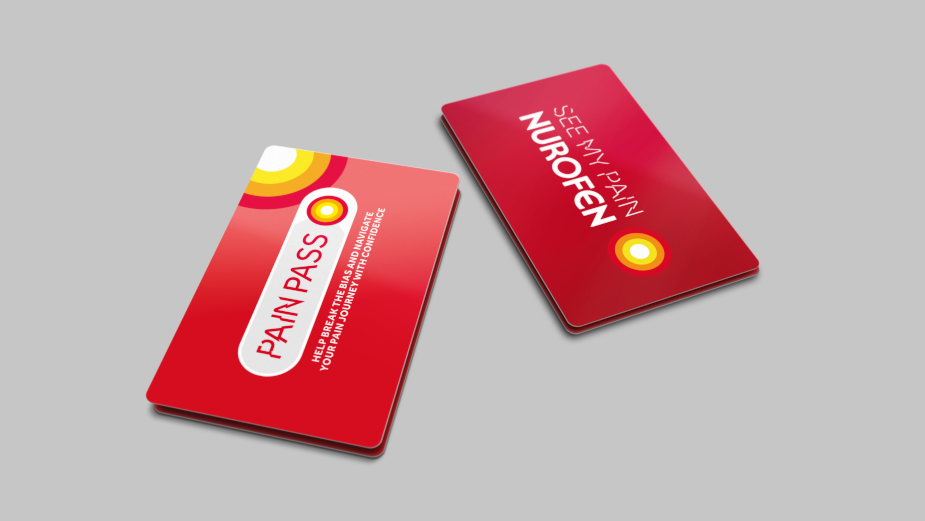
Nurofen's 'Pain Pass' Helps Women Navigate Pain Journey's with Confidence

McCann London has launched the next phase of the See My Pain platform with one of the UK’s leading pain brands, Nurofen. With a fifth of women (20%) wanting more resources to aid better conversations between women and their healthcare professionals[1], Nurofen has launched the Pain Pass, a free downloadable PDF to help people track and articulate their pain and symptoms, aid more constructive conversations with their healthcare professional, and help tackle unconscious bias[2].
McCann London has created the Pain Pass digital tool, fronted by a simple acronym (PASS) to help women know what to do in the face of bias: P (pause the conversation) A (ask questions for clarity) S (speak up) S (seek another opinion). The Pain Pass, created in collaboration with Healthcare Professionals (HCPs) and real women, is now available to download via Nurofen’s See My Pain website. It includes a pain scale to help women and doctors understand the severity of the pain women face, pain vocabulary to help women find the right words to accurately express their pain, a calendar for women to track their pain, and tips to boost women’s confidence and help them to advocate for themselves in their interactions with HCPs.

Steered by McCann London’s creative director, Ruth Boulter, McCann Worldgroup’s Ambition Collective, an initiative aimed at creating more opportunities for all-women creatives in the industry, played a critical role in the creation of the PASS acronym.
Ruth Boulter, creative director at McCann London said, “For this part of the powerful See My Pain platform, we spoke to thousands of women at various stages of their pain journeys, to change the way we support women in pain. It became clear that the journey to a successful diagnosis is rarely straightforward and relies on women having the strength to advocate for their own pain in the face of repeated disbelief and dismissal. This is why we created the Pain Pass. This is a first of its kind tool that helps women to break the bias in healthcare. It’s deceptively simple and above all, human. It gives Doctors the key information they need and helps women express their individual pain, on their own terms.”
Rose Gell, category manager at Reckitt said, “The launch of the See My Pain campaign one year ago was part of a bold strategic choice from Nurofen to commit to helping make a difference in women’s lives, rooted in the painful insight that there is, sadly, a gender pain gap. The development of the Pain Pass tool, our HCP gender bias training, and research partnerships with Wellbeing of Women demonstrate our ongoing commitment to help close the gap over time and improve the quality of conversations happening in society on pain.”

The Pain Pass was launched at a two-day immersive exhibition. The See My Pain Exhibition was a unique experience exposing the bias many women face when seeking help and a diagnosis for their pain. The exhibition, which spotlighted 13 new dismissal packs, was a thought-provoking maze-like takeover exposing the reality of some women’s journey to a successful pain diagnosis and treatment.
At the exclusive launch night, Nurofen introduced the Pain Pass alongside its second Gender Pain Gap Index Report, steered by IPG agency Golin, showing the current state of the Gender Pain Gap in the UK. The evening was well attended by charities, HCPs and Members of Parliament including guest speakers Jess Phillips, MP, Claire Cohen (journalist) and Dr Marieke Bigg, sociologist and author of ‘This Won’t Hurt: How Medicine Fails Women’.
The Pain Pass is supported by a full creative campaign. The hero See My Pain 30” film, spotlighting the stories of five women, is now live across TV, digital and social promoting the digital tool alongside the PASS acronym for women to remember. IPG agency Golin spearheaded the Gender Pain Gap Report research.
To view the full Index report, download the Pain Pass and find out how Nurofen is delivering on its commitments, visit here.
Nurofen’s Gender Pain Gap Index Report 2023
When it comes to healthcare, a ‘male by default’ approach has been prevalent across research, clinical trials and the design of policies and services[3]. While some acknowledgement had been made of this bias, less had been reported on the impact it has on how women get support for pain.
2022’s data showed over half of women (56%) felt their pain was ignored or dismissed compared to 49% of men – revealing a Gender Pain Gap of 7%[4].
A year on, while fewer of the women surveyed (49%) than last year say their pain has been ignored or dismissed than men (38%), sadly the gap has widened to 11%[5].
New research by Nurofen reveals it also takes UK women longer than men to receive a medical diagnosis for the same types of pain – less than half (47%) of women surveyed received a diagnosis within 11 months compared to two thirds (66%) of men[6].
Dr Bill Laughey, senior medical scientist at Reckitt says, “Our latest research shows that fewer feel their pain has been dismissed - perhaps because awareness is driving better quality conversations between patients and healthcare professionals. Whilst a positive step forward, the gap has widened and this needs to stop. We’ve developed the PAIN PASS in collaboration with leading pain specialists and women experiencing pain. It is designed to empower women to get the support and treatment they need. But we can’t close this gap by ourselves. We’re also calling on policymakers, the healthcare industry and medical stakeholders to come together to implement meaningful changes, such as effective gender bias training for all healthcare professionals.”
Nurofen has become a positive force for good, empowering women to break the bias they face in navigating their pain journey.
As part of several key commitments Nurofen have made to help close the Gender Pain Gap, the brand has established free Gender Pain Gap training for healthcare professionals. To date, two-thirds of Superdrug’s pharmacists, pharmacy assistants and nurses have completed the training. Nurofen is also partnering with the charity Wellbeing of Women to fund an innovative new piece of research. The study, which will happen over three years, will investigate health literacy levels and attitudes towards menstrual pain in adolescent girls and women. It will also address the impact these attitudes have had over time on women’s health journeys.















